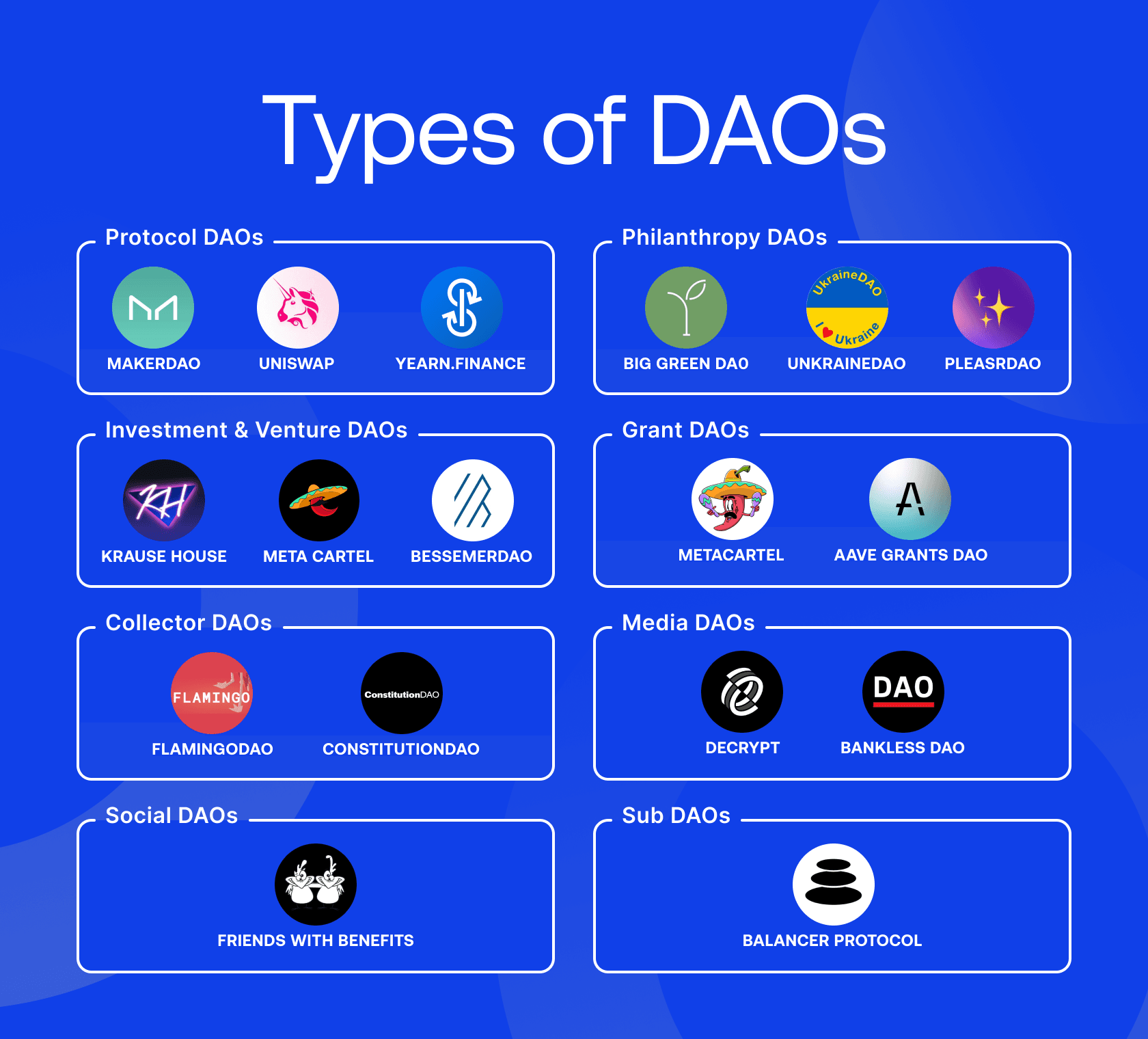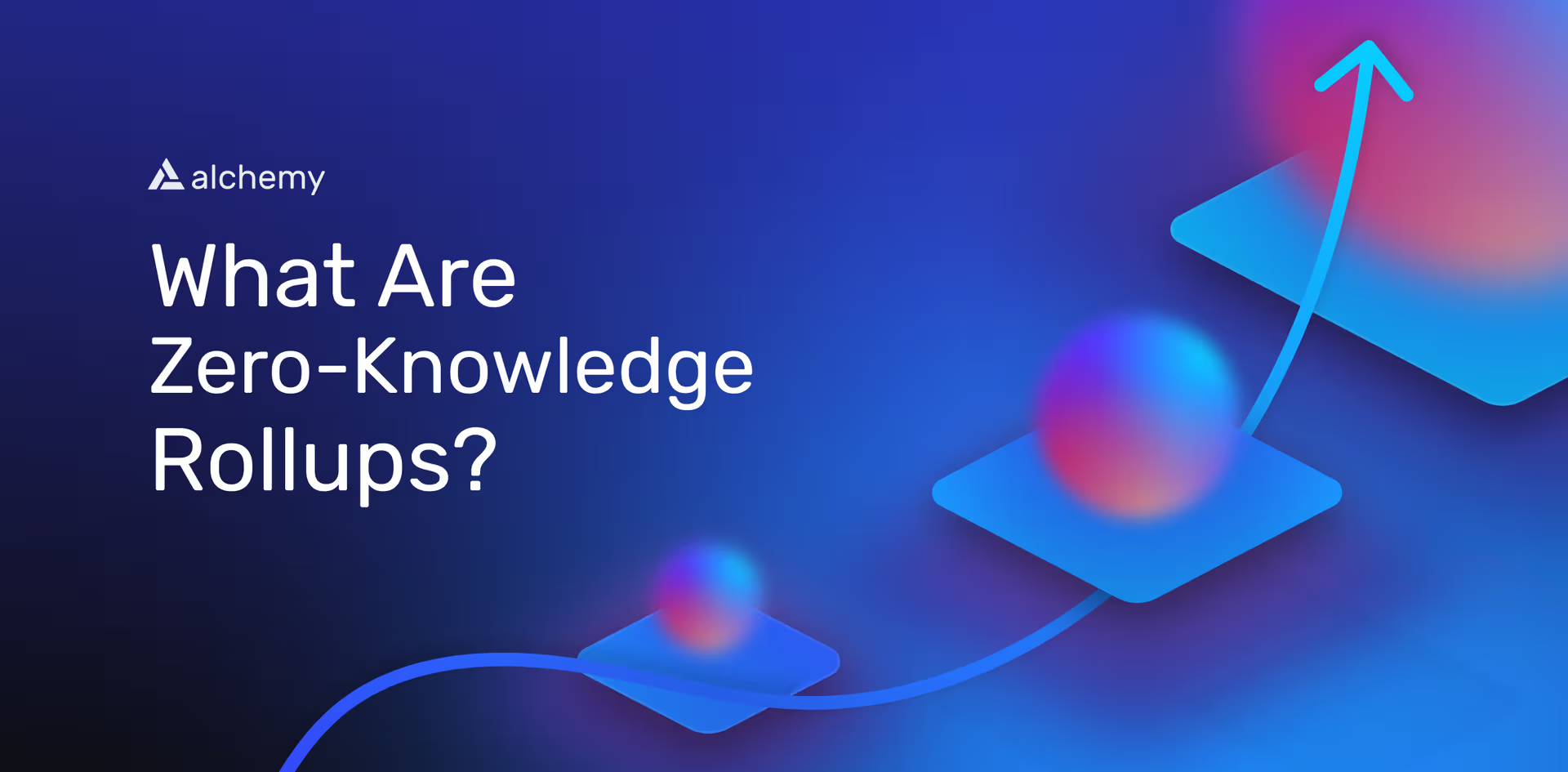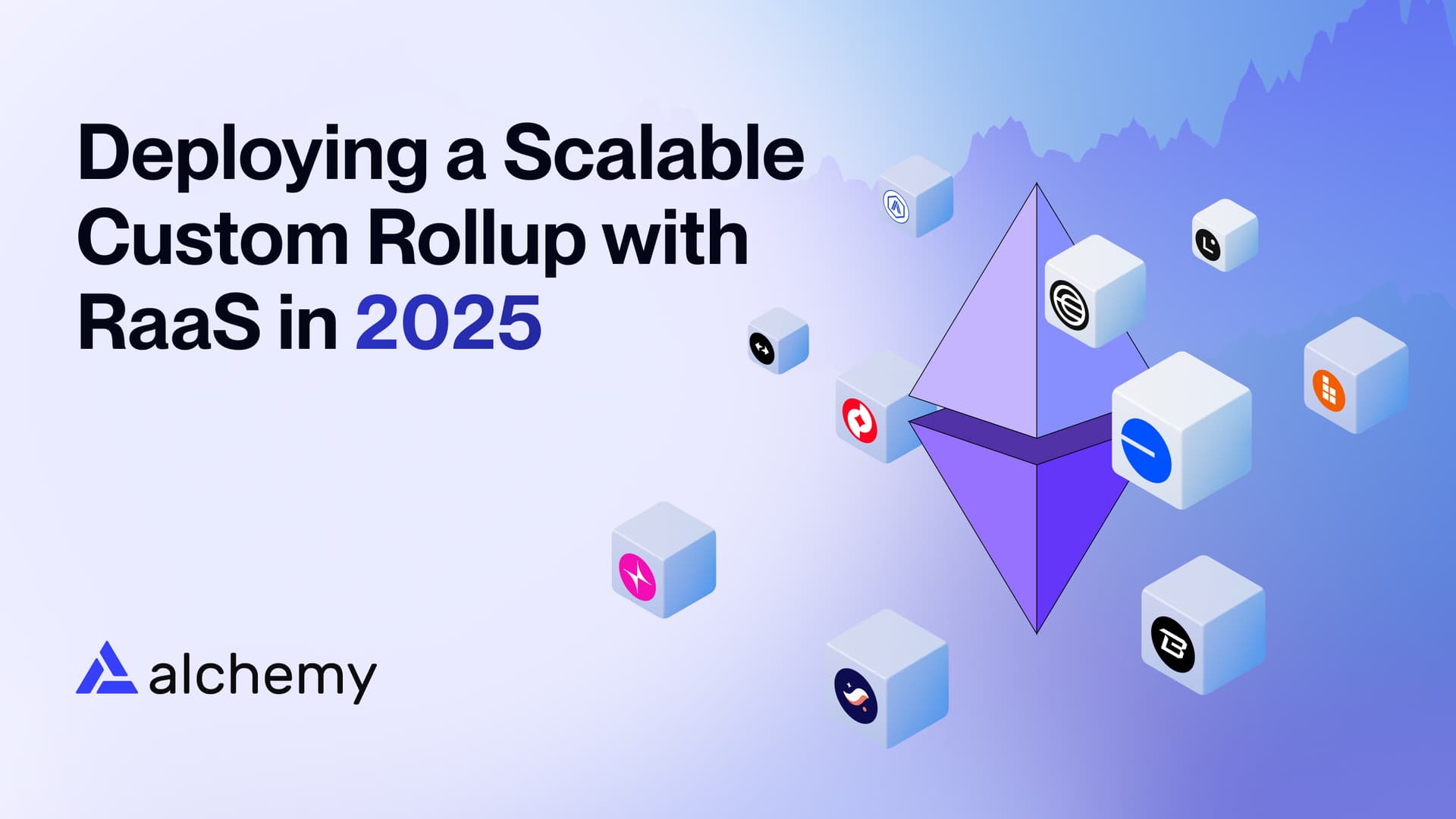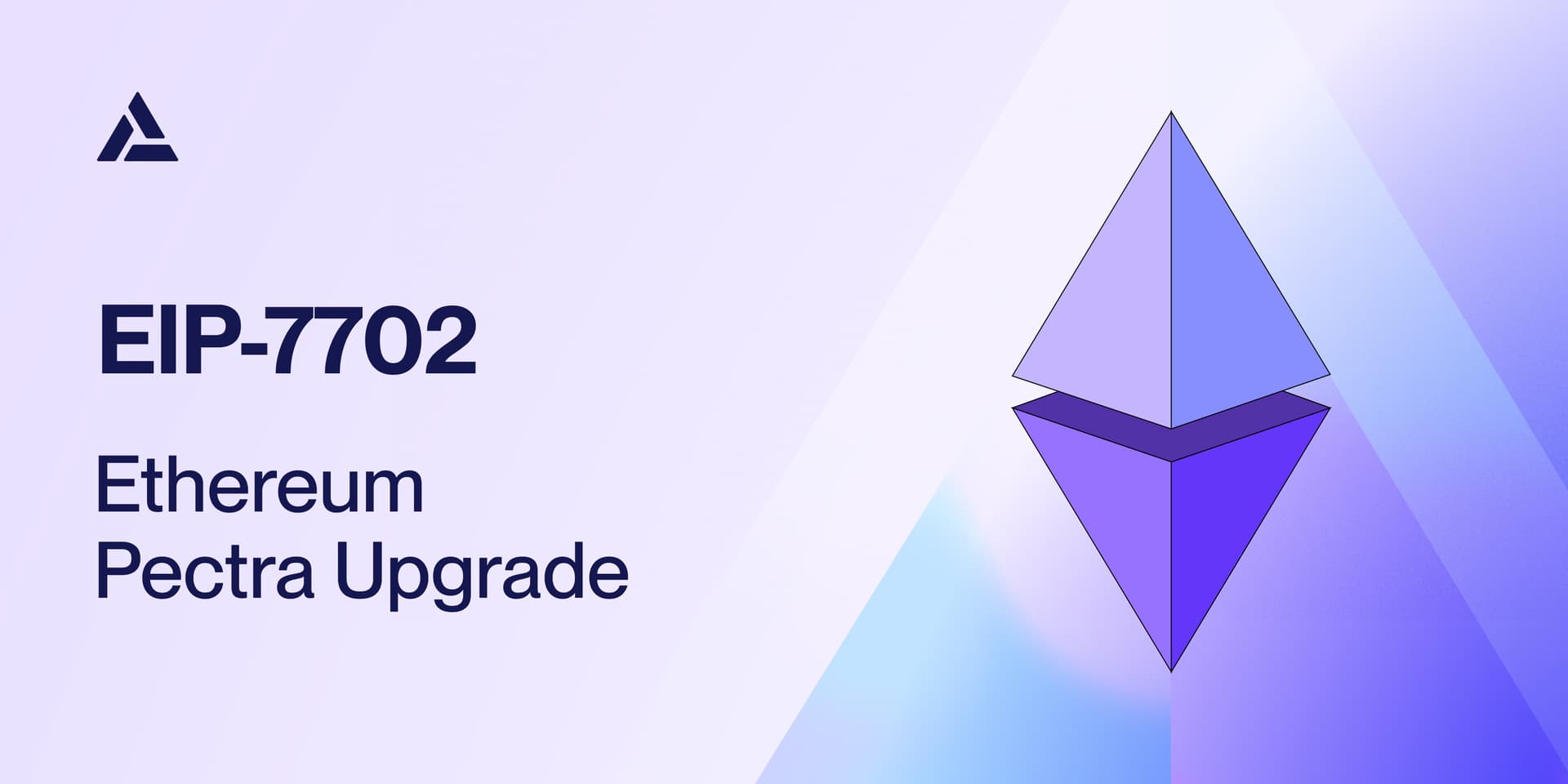The 8 Most Important Types of DAOs You Need to Know
Author: Bud Hennekes
The 8 Most Important Types of DAOs You Need to Know
As the world of blockchains and crypto continues to mature, launching decentralized autonomous organizations (DAOs) are becoming popular options for managing digital-native collectives.
DAOs offer the unique opportunity to grow and build communities and businesses in a decentralized way. From the largest decentralized exchange, UniSwap, to a DAO designed to raise $3 Million in support of the Ukrainian Army; there is no shortage of DAO use cases.
Members of these decentralized autonomous organizations collaborate according to a shared set of rules encoded on a blockchain and, as a result, have begun disrupting everything from finance to charity and more.
But not all DAOs are created equal. Different types serve different purposes, and the benefits of DAOs are not applicable to every digital-first team or web3 project. If you're looking to better understand the many kinds of DAOs today, we have you covered.
The First Decentralized Autonomous Organization
Before we dive into the different kinds of DAOs, a brief history lesson is in order.
Aptly named "The DAO", the first Decentralized Autonomous Organization was built using smart contracts, used an open-source framework, and focused on venture capitalism.
Unfortunately, a smart contract bug exploit lost The DAO 3.6 million ETH, and they did not recover financially. Regardless, The DAO paved the way for many more successful DAOs.
The Summer of DeFi in 2018 brought flagship Decentralized Finance projects to the Ethereum blockchain such as Compound Finance (COMP), Uniswap (UNI), and Aave (AAVE), which offered attractive ways for community members to demonstrate their commitment to decentralization through governance tokens and DAO governance.
Ultimately, the success of DAOs were the result of innovations in blockchain technology such as smart contracts, on-chain governance (voting), empowered community members redefining how decisions are made, and new organizational legal structures without a central authority.
As the web3 ecosystem grows, blockchain technology evolves, and innovators experiment with new kinds of models, it's likely we'll continue to see DAOs push the limits of what's possible.

Types of DAOs
There are eight main types of DAOs:
Protocol DAOs
Grant DAOs
Philanthropy DAOs
Social DAOs
Collector DAOs
Venture DAOs
Media DAOs
SubDAOs
Because new types of DAOs are being developed regularly, we won't be able to cover every DAO category. That said, if you're exploring how to create your own DAO, let's dive into the most common kinds of DAOs and their goals.
1. Protocol DAOs
A protocol DAO is a kind of DAO that is designed to govern a decentralized protocol such as a borrow/lending application, decentralized exchange, or another type of dapp.
Protocol DAO Examples
Three of the most notable protocol DAO examples are MakerDAO, Uniswap, and Yearn Finance.
MakerDAO
One of the original DeFi applications on the Ethereum blockchain network, MakerDAO uses smart contracts to enable users to lend and borrow cryptocurrencies with customized lending rates and repayable amounts.
MakerDAO uses MKR governance tokens so holders can vote on changes to the Maker Protocol, including the amount of collateral for collateralized debt positions (CDPs), annual borrowing, and shutting down if Ethereum crashes.
MKR holders also act as the buyers of last resort for DAI loans (an algorithmic stablecoin created by MakerDAO). If the value of ETH in Maker Vaults doesn't cover the amount of DAI in circulation, MKR is created and sold in a debt auction to raise the needed amount of funds.
Uniswap
Uniswap launched its governance token, UNI, giving the community voting rights in the Uniswap's development and operations. Holders of UNI tokens control the Uniswap governance, UNI community treasury funds, the protocol fee switch, and more.
If token holders want to alter Uniswap or introduce new features, a proposal is submitted with a minimum of 25,000 UNI yes-votes to be eligible for further deliberation.
Yearn Finance
Like the above governance token-powered DAOs, Yearn DAO delegates funding to DAO Vaults. YFI holders can provide funds to DAOs approved to accept funding in the DAO vault ecosystem. Filling a gap in the traditional HR and payroll system, YFI founder Andre Cronje built Coordinape to allocate funds and reward contributors autonomously.
2. Grant DAOs
Grant DAOs are designed to facilitate nonprofit donations, strategically deploy capital assets throughout the web3 ecosystem, and are either a charitable extension of a larger project or an entirely separate entity in the DeFi space.
Grant DAO Examples
Aave Grants DAO is a community-led program to fund ideas and projects that power the development of Aave Protocol, focusing on supporting a more comprehensive network of community developers.
Aave Grants allocate a specified amount of funding per quarter. Eligible grant submissions include but aren't limited to; Aave development, integrations, developer tools, and more.
One example of a Grant DAO that is a separate entity is MetaCartel, which creates financial funding to projects and provides operational support for early-stage dapps.
On a mission to accelerate the creation of Web 3, MetaCartel awards grants between $1,000 to $10,000 for dApps built on Ethereum, new consumer-facing use-case experiments, the creation of new DAOs, community-oriented initiatives, and more.
3. Philanthropy DAOs
Philanthropy DAOs aim to help progress social responsibility by organizing around a shared purpose to create an impact in the world of Web3.
Philanthropy DAO Examples
The first nonprofit philanthropic DAO, Big Green DAO, is tied to Big Green, a national 501(c3) food justice charity that teaches people how to grow food to improve nutrition security, mental health, and climate impact. Big Green DAO latched onto the decade-old charity to restructure grant-making and put the nonprofit in a favorable financial position.
The speed at which DAOs organize and execute is a testament to the power of Web3. UkraineDAO raised over $3 million in ETH to support the Ukrainian Army in less than a week.
Coordinated by members of PleasrDAO, Trippy Labs, and Russian art collective Pussy Riot, UkraineDAO uses the ENS domain, ukrainedao.eth, to send donations to Ukrainian soldiers, and support the Ukrainian organization, Come Back Alive.
Simply put, the popularity of the crypto combined with the simplicity of international remittances allow philanthropy DAOs to create a meaningful impact at record-breaking speed.
4. Social DAOs
Social DAOs, or creator DAOs, are focused on the self-organizing community aspect of DAOs by bringing together like-minded individuals such as builders, artists, and creatives.
While Social DAOs are community focused, typically they have a barrier to entry such as owning a specific number of tokens, owning an NFT, or being personally invited.
Creator DAO Examples
Developer DAO is a collective of web3 developers focused on building the future of web3. To join Developer DAO, members must hold a genesis NFT or be one of the lucky developers invited into the private Discord server.
Friends With Benefits, is a web3 creator DAO focused on building community and fostering creativity. Access to Friends With Benefits is 75 $FWB tokens, and once admitted, members have full access to connect with builders, artists, creatives, and attend exclusive events.
While DeFi was arguably built on the principles of accessibility, many social DAOs derive value from exclusivity, collaboration, and interpersonal network effects.
5. Collector DAOs
The main purpose of Collector DAOs is for members to pool funds together so that the collective community can invest treasury funds in blue chip NFT art and other collectibles, where each member owns a share corresponding to their personal investment.
Collector DAO Examples
Notable collector DAOs such as FlamingoDAO rose with the explosion of NFTs which collected incredibly expensive NFTs from digital artists like Pak, Hackatao, XCopy, and CryptoPunk #2890 NFT, which was purchased in 2021 for $760k USD.
Another group of collectors formed ConstitutionDAO in an attempt to buy the United States Constitution. Remarkably, ConstitutionDAO raised $47 million worth of ETH in one week to try to buy a first-edition copy of the U.S. Constitution at a Sotheby's auction.
Though not every collector DAO will pay off, it is a new medium for investors to get financial exposure to expensive NFTs without risking large amounts of personal capital.
6. Investment and Venture DAOs
Venture DAOs pool capital to invest in early stage web3 startups, protocols, off-chain investments, and get access to portfolios not available in traditional finance.
Venture DAO Examples
Krause House DAO is a Venture DAO trying to buy a professional NBA team that is made up of investors and basketball fanatics. Krause House DAO members would participate in decisions affecting the operating procedures of a National Basketball Association team, including but not limited to general management, ticketing, merchandising, and partnerships.
Other notable venture DAOs include MetaCartel Ventures (MCV) which is a for-profit DAO established by the MetaCartel community to invest in early-stage Decentralized Applications (DApps), and BessemerDAO, which was launched by the San Francisco-based VC firm Bessemer Venture Partners, to discuss trends in the crypto industry and sharing resources.
7. Media DAOs
In contrast to a top-down approach where content is produced with a central agenda or influenced by advertisers, Media DAOs reinvent traditional media platforms by creating content driven by the community.
Think social media, but instead of corporate organizations governing the profits, individuals in the media network are actively earning a piece of the decentralized organization's profit.
Media DAO Examples
BanklessDAO is a decentralized community to coordinate and propagate bankless media, culture, and education. Its goal is to drive the adoption of a truly bankless money system.
Decrypt is another media DAO example that empowers users to vote on what types of content they want to see.
Media DAOs are especially powerful for up-and-coming communities looking to reward their users as the crypto community and Web 3.0 culture grow.
8. SubDAOs
A SubDAO is a new kind of DAO that is a subset of DAO members that are organized to manage specific functions such as operations, partnerships, marketing, treasury, and grants.
Balancer Protocol saw an opportunity with its growing DAO membership and proposed to create subDAOs to manage DAO-related decision-making and facilitate execution, without requiring every proposal to be passed by the entire DAO.
In a unanimous vote, Balancer DAO successfully integrated subDAOs into their structure and are now able to move more efficiently as a Decentralized Autonomous Organization.
The creativity of the community is truly the limit of what can be built within the DAO framework.
Launch your own DAO today
Understanding the many use cases and kinds of DAOs is crucial for choosing the right avenue for your business. DAOs continue to play an increasingly important role in the future of crypto and Web3.
Alchemy Newsletter
Be the first to know about releases
Sign up for our newsletter
Get the latest product updates and resources from Alchemy
By entering your email address, you agree to receive our marketing communications and product updates. You acknowledge that Alchemy processes the information we receive in accordance with our Privacy Notice. You can unsubscribe anytime.
Related articles

What are Zero-Knowledge Rollups (ZK-rollups)?
Explore ZK-rollups, a fast-growing L2 design. Learn how they cut costs, enable instant finality, and boost security.

Deploying Scalable Custom Rollups with a RaaS in 2025
Ambitious teams are increasingly deploying a rollup with RaaS in 2025. Here's why.

EIP-7702: Quick Integration Guide for Ethereum Developers Post-Pectra
Ethereum is on the brink of an important upgrade with EIP-7702. Here's a quick guide on integration considerations for all developers.